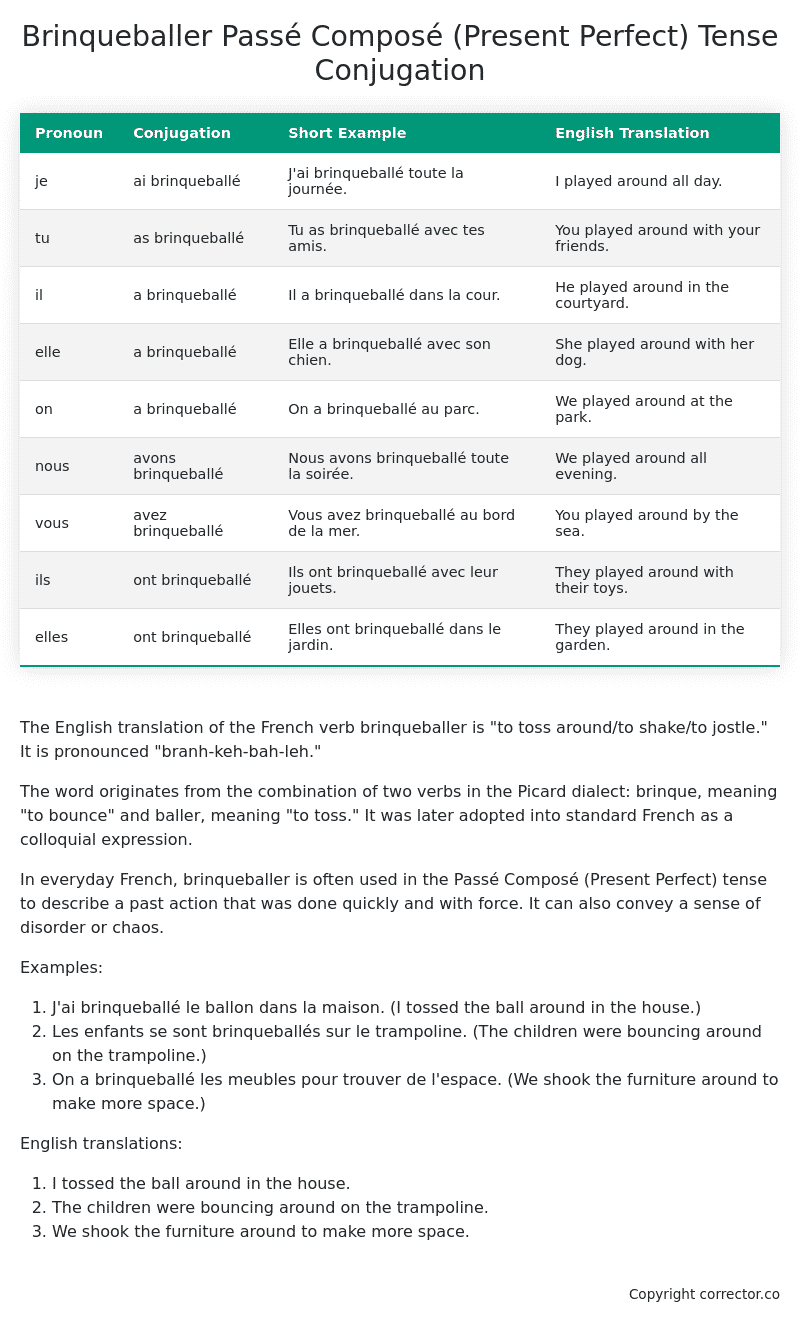Passé Composé (Present Perfect) Tense Conjugation of the French Verb brinqueballer
Introduction to the verb brinqueballer
The English translation of the French verb brinqueballer is “to toss around/to shake/to jostle.” It is pronounced “branh-keh-bah-leh.”
The word originates from the combination of two verbs in the Picard dialect: brinque, meaning “to bounce” and baller, meaning “to toss.” It was later adopted into standard French as a colloquial expression.
In everyday French, brinqueballer is often used in the Passé Composé (Present Perfect) tense to describe a past action that was done quickly and with force. It can also convey a sense of disorder or chaos.
Examples:
- J’ai brinqueballé le ballon dans la maison. (I tossed the ball around in the house.)
- Les enfants se sont brinqueballés sur le trampoline. (The children were bouncing around on the trampoline.)
- On a brinqueballé les meubles pour trouver de l’espace. (We shook the furniture around to make more space.)
English translations:
- I tossed the ball around in the house.
- The children were bouncing around on the trampoline.
- We shook the furniture around to make more space.
Table of the Passé Composé (Present Perfect) Tense Conjugation of brinqueballer
| Pronoun | Conjugation | Short Example | English Translation |
|---|---|---|---|
| je | ai brinqueballé | J’ai brinqueballé toute la journée. | I played around all day. |
| tu | as brinqueballé | Tu as brinqueballé avec tes amis. | You played around with your friends. |
| il | a brinqueballé | Il a brinqueballé dans la cour. | He played around in the courtyard. |
| elle | a brinqueballé | Elle a brinqueballé avec son chien. | She played around with her dog. |
| on | a brinqueballé | On a brinqueballé au parc. | We played around at the park. |
| nous | avons brinqueballé | Nous avons brinqueballé toute la soirée. | We played around all evening. |
| vous | avez brinqueballé | Vous avez brinqueballé au bord de la mer. | You played around by the sea. |
| ils | ont brinqueballé | Ils ont brinqueballé avec leur jouets. | They played around with their toys. |
| elles | ont brinqueballé | Elles ont brinqueballé dans le jardin. | They played around in the garden. |
Other Conjugations for Brinqueballer.
Le Present (Present Tense) Conjugation of the French Verb brinqueballer
Imparfait (Imperfect) Tense Conjugation of the French Verb brinqueballer
Passé Simple (Simple Past) Tense Conjugation of the French Verb brinqueballer
Passé Composé (Present Perfect) Tense Conjugation of the French Verb brinqueballer (this article)
Futur Simple (Simple Future) Tense Conjugation of the French Verb brinqueballer
Futur Proche (Near Future) Tense Conjugation of the French Verb brinqueballer
Plus-que-parfait (Pluperfect) Tense Conjugation of the French Verb brinqueballer
Passé Antérieur (Past Anterior) Tense Conjugation of the French Verb brinqueballer
Futur Antérieur (Future Anterior) Tense Conjugation of the French Verb brinqueballer
Subjonctif Présent (Subjunctive Present) Tense Conjugation of the French Verb brinqueballer
Subjonctif Passé (Subjunctive Past) Tense Conjugation of the French Verb brinqueballer
Subjonctif Imparfait (Subjunctive Imperfect) Tense Conjugation of the French Verb brinqueballer
Conditionnel Présent (Conditional Present) Tense Conjugation of the French Verb brinqueballer
Conditionnel Passé (Conditional Past) Tense Conjugation of the French Verb brinqueballer
L’impératif Présent (Imperative Present) Tense Conjugation of the French Verb brinqueballer
L’infinitif Présent (Infinitive Present) Tense Conjugation of the French Verb brinqueballer
Struggling with French verbs or the language in general? Why not use our free French Grammar Checker – no registration required!
Get a FREE Download Study Sheet of this Conjugation 🔥
Simply right click the image below, click “save image” and get your free reference for the brinqueballer present perfect tense conjugation!

Brinqueballer – About the French Passé Composé (Present Perfect) Tense
Formation of the Passé Composé
Set the auxiliary verb with either
Conjugate the auxiliary verb
Add the past participle
Common everyday usage patterns
Narrating Past Events
Sequential Actions
Describing Completed Actions
Interactions with other tenses
Imperfect Tense
Conditional and Future Tenses
Summary
I hope you enjoyed this article on the verb brinqueballer. Still in a learning mood? Check out another TOTALLY random French verb conjugation!


